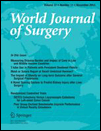How Useful Are Perioperative Biochemical Parameters in Predicting the Duration of Calcium and/or Vitamin D Supplementation After Total Thyroidectomy?
Abstract
Background
Oral calcium and calcitriol are often prescribed after total thyroidectomy to avoid biochemical and/or symptomatic hypocalcemia. We aimed to identify independent perioperative factors that correlated with the duration of calcium and/or calcitriol supplementation after total thyroidectomy.
Methods
Of 271 eligible patients, 48 (17.7 %) required calcium and/or calcitriol supplements on discharge. Patients were gradually weaned from the supplementation by one surgeon according to a biweekly algorithm based on serum calcium (Ca). Duration of supplementation was calculated from the date of operation to the date of ceasing all supplementation without biochemical hypocalcemia (i.e., serum adjusted Ca ≥8.44 mg/dL). The Cox regression analysis was performed to identify independent perioperative factors for duration of supplementation. The best cut-off value for these independent factors was determined by the receiver characteristic curve.
Results
In the multivariate analysis, parathyroid hormone (PTH) at skin closure (PTH-SC) (RR 1.742, 95 % CI 1.080–2.810) and on postoperative day 1 adjusted Ca (Ca-D1) (RR 77.526, 95 % CI 3.600–1669.57) were the only two independent determinants for shorter duration before ceasing all supplementation. The best cut-off values in predicting supplementation ≥6 months for PTH-SC and Ca-D1 were 7.08 pg/mL (sensitivity = 100 %, specificity = 60.5 %, PPV = 40.0 % and NPV = 100 %) and 7.88 mg/dL (sensitivity = 90.0 %, specificity = 55.3 %, PPV = 34.6 % and NPV = 95.5 %), respectively.
Conclusions
Both PTH-SC and Ca-D1 were independently associated with the duration of supplementation after total thyroidectomy. Almost all patients with PTH-SC ≥7.08 pg/mL or Ca-D1 ≥7.88 mg/dL did not require supplementation ≥6 months whereas about one third of patients with PTH-SC <7.08 pg/mL or Ca-D1 <7.88 mg/dL required supplementation ≥6 months.




